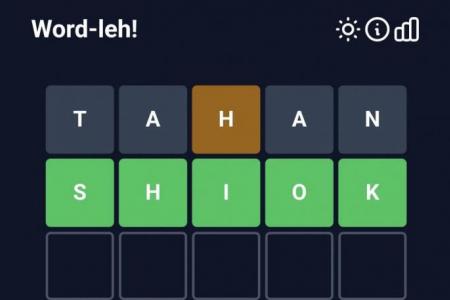Singlish spin on Wordle a surprise hit for Singaporean creator
"Bojio", "kiasu" and "aiyah" - these are just some of the five-letter words that feature in Word-leh, the Singlish spin-off of viral online word game Wordle.
And it is becoming a sensation of its own, drawing more than 50,000 visitors to date, about a third of whom went on to actually play the game.
Its creator, New York-based Singaporean Sha-Mayn Teh, says in an e-mail interview: "I was very surprised that Word-leh spread so quickly. I made Word-leh to play with friends and suddenly there was pressure to have a solid word list.
"Once Word-leh got a thousand visitors, I decided to buy a nicer domain."
Ms Teh, who has a background in software engineering and has led engineering teams at Google and start-ups, used an open source clone of the original Wordle game to create Word-leh.
She sent it to friends on Feb 1 and released it to the public on Tuesday (Feb 8). By Wednesday afternoon, it was so popular that she relaunched on a new domain, word-leh.com.
Word-leh's gameplay is virtually identical to Wordle. Every day, players have six attempts to guess a five-letter word, with green blocks indicating a correctly placed guess, while yellow blocks mark out a correct letter in the wrong position.
But where Wordle uses common English words for its solutions, Word-leh invites participants to guess the secret Singlish word, from "makan" (eat) to "bojio" (no invitation/missing out).
Singapore actor Hossan Leong was an early ambassador of Word-leh. On Tuesday, he tweeted about it, inviting netizens here to try it out.
Word-leh's quick success echoes that of Wordle, which was made available to the public only in October last year, yet had already amassed a player base of more than 10 million as at January, according to United States media outlet Time Magazine.
Ms Teh says the vast majority of Word-leh players are in Singapore, with the US in second place, followed by Malaysia. There have even been players in Germany.
An unusual challenge she faced in generating the word bank for Word-leh was the spelling of many words that are spoken colloquially, but which do not have a definitive textual form.
While there are some longstanding Singlish words with widely accepted spellings - people default to "aiyah" (an expression that denotes exasperation or annoyance) rather than "aiya" in Singapore, for example - other words are not so established.
Should it be "macam" or "machiam" (to bear resemblance)? "Walau" or "walao" (an exclamation of disbelief)? "Swaku" or "suaku" (uninformed/backward)? "Jelat" or "jelak" (bored/sick of eating)?
Ms Teh says that if the word originated in Malay, then the original spelling wins - so "macam", not "machiam".
"But if it's Hokkien, the romanisation isn't standard so there could be multiple variations that are widely used. Sometimes I pick the one that looks more official and if it's unclear, I 'tikam-tikam' (randomly pick) or include both," says Ms Teh, who declined to give her age.
She consulted books on Singlish such as the Coxford Singlish Dictionary (2002) by Colin Goh and Woo Yen Yen and Spiaking Singlish (2017) by Dr Gwee Li Sui to populate the word list.
For anyone sceptical about whether there really that many five-letter Singlish words, there's no need to fret.
Dr Gwee, 51, a poet and literary critic, says that the game can definitely go on for a few more years. "Singlish has a large, as-yet unfinished and growing registry of words. Nobody can comment on how large it really is."
He feels Word-leh is likely to continue evoking fresh debate on what exactly Singlish is and what it means to each individual Singaporean.
"We are now entering the age of Singlish as text and not just speech. That brings a whole range of new, important questions," he adds.
For Ms Teh, who has been living in New York for more than a decade, Singlish is an integral part of her Singaporean identity. "If I meet another Singaporean on the street we can instantly talk c*** and bemoan the lack of good laksa.
"For me, Singlish is about community and culture, and it's a way of keeping a connection to Singapore wherever I go."
Get The New Paper on your phone with the free TNP app. Download from the Apple App Store or Google Play Store now


